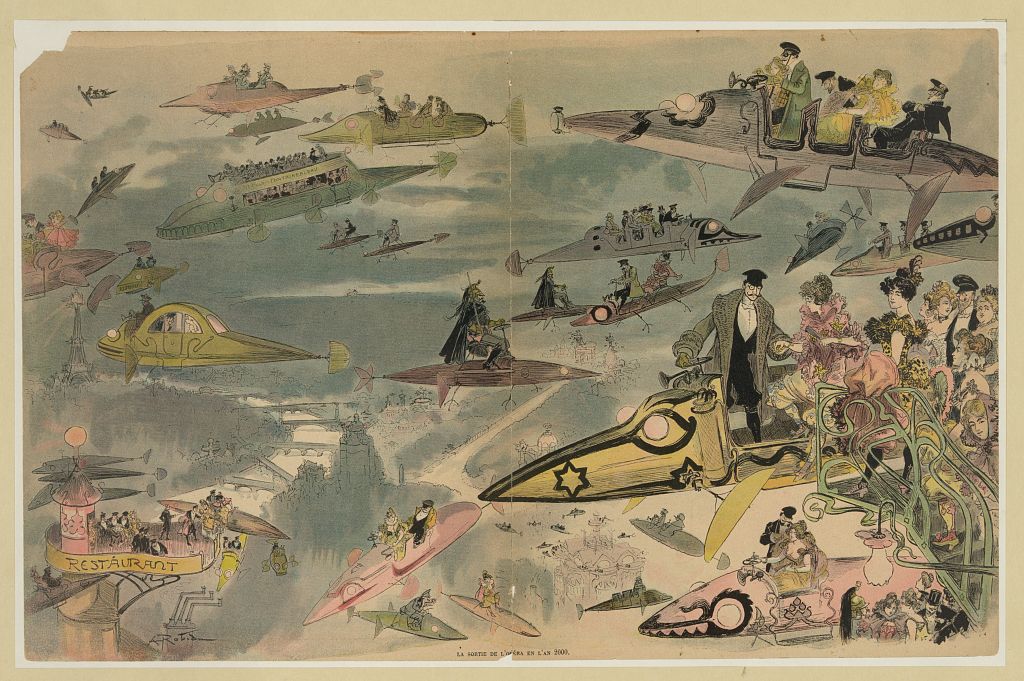Teach This Poem is a weekly series featuring a poem from our online poetry collection, accompanied by interdisciplinary resources and activities designed to help K-12 teachers quickly and easily bring poetry into the classroom.
 Albert Robida (French, 1848–1926), Le Sortie de l'opéra en l'an 2000. Print: lithograph, hand-colored, c. 1902. From the Library of Congress Prints and Photographs Division.
Albert Robida (French, 1848–1926), Le Sortie de l'opéra en l'an 2000. Print: lithograph, hand-colored, c. 1902. From the Library of Congress Prints and Photographs Division.
-
Warm-up: Sketch a picture of what you think the world will look like in fifty years. Share with a classmate and describe what you sketched.
-
Before Reading the Poem: Look at the image of the print “Leaving the Opera in the Year 2000.” Discuss with your partner how this image compares to your sketch.
-
Reading the Poem: Read the poem “Letter to Someone Living Fifty Years From Now” by Matthew Olzmann silently. What do you notice about the poem? Annotate for any words or phrases that stand out to you or any questions you might have.
-
Listening to the Poem: Listen as the poem is read aloud twice, once by a student and once by the poet. Write down any additional words and phrases that stand out to you. Call back the lines that you like by saying these lines aloud with your partner.
-
Small-group Discussion: Share what you noticed in the poem with a small group of students. Based on these details, how might the poem compare or contrast with your image of the future or the print of “Leaving the Opera in the Year 2000?”
-
Whole-class Discussion: What imagery stands out in the poem? Why? (Teachers, if you haven’t introduced imagery yet, now might be a good time to do so.) What might the speaker in the poem want the future person to know about the past?
-
Extension for Grades 7-8: Write a poem to someone fifty years in the future. What do you want to tell this person about your life right now? Or, with your small group discuss ways to make your school more environmentally friendly. Share your ideas in a whole-class discussion for Earth Day. (Teachers, if your school has a green initiative, you might want to prepare information about this initiative with your students before they begin their small-group work.)
-
Extension for Grades 9-12: Create a class time capsule. Decide with your teacher and classmates when you want to open it and what you want to include. Or, in honor of Earth Day, work with your teacher and classmates to conduct a classroom or school-wide waste or recycling assessment. Present your findings to your whole class or school. (Teachers, if you decide to conduct the waste or recycling assessment, you may want to partner with a science teacher.)
More Context for Teachers
In this interview about the Treehouse Climate Action Poem Prize, the team at Treehouse Investments explains the importance of poems about the climate crisis: “We have failed, somehow, to humanize this issue. We have failed to communicate, or perhaps to understand. We are failing to inspire. We came to understand that we were dealing not with a climate crisis but with a human one. A good poem reminds us of our shared humanity. A good poem will string words together like pearls and connect us, shock us out of our usual tropes. A good poem reminds us of everything we share and everything we put at risk.”
